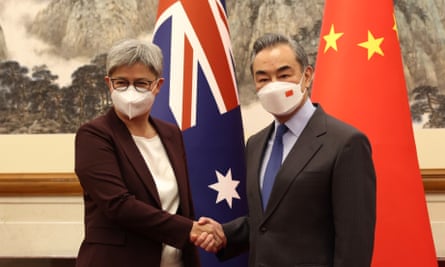Australia’s lobster industry is cautiously optimistic that China could soon remove trade restrictions, but exporters are wary of being “burned again” by sanctions and volatile diplomatic relations.
Many businesses have been paying close attention to foreign affairs minister Penny Wong’s trip to China this week – the first by an Australian minister in three years – where she discussed “trade blockages” with her counterparts.
At the height of a diplomatic rift in 2020, Beijing imposed a range of tariffs, bans and restrictions on Australian exports including wine, barley and lobsters, which are popular with Chinese consumers.
South Australian company Ferguson Australia was exporting up to 500 tonnes of lobster to China in 2020, before nine shipments of live product were quarantined by customs officials.
“I am watching what’s happening now and it sounds positive, but we just don’t want to get burned again and be in the same position that we were a few years ago,” said the company’s director Andrew Ferguson.
“That way of running a business is very volatile and we want to keep away from that if we can. We don’t want Beijing to get upset with a politician here saying the wrong thing and then it all happens again.”
Speaking after a meeting with China’s foreign minister, Wang Yi, Wong said “there was a discussion about opportunities for further dialogue” and removing trade blockages.
“I think the point I was making, and I’ll continue to make, is dialogue is a prerequisite for managing this relationship wisely,” said Wong.
A joint statement published after the meeting said China and Australia had agreed to begin or resume dialogue in a range of areas, including trade and economic issues.

The trade restrictions had a big impact on the Australian lobster industry, with exports to China once worth around $1.6bn a year. Ferguson warns a return to pre-sanction trade is not guaranteed.
“Our Chinese clients have all moved on and are doing different things. It’s been a few years. It might be completely different to the free trade we had before,” said Ferguson.
“If China comes back in the way we would like it to, then there is a positive story there, but we don’t know how this will unfold and whether it’s still going to be volatile.”
Lowy Institute’s director of research, Hervé Lemahieu, urged Australian businesses not to “get ahead of themselves” or expect a quick and complete reversal of trade measures.
“I think it will be happening in drip-feeds and that it will be happening incrementally and it can always be reserved. So I think we have to live with that reality going forward, even if things improve,” Lemahieu told ABC Radio.
“We are seeing early steps in the stabilisation of the relationship and we can perhaps hope for a slightly more professional, calmer, less fraught, day-to-day relationship with China.
“But at the same time, there is still a great deal of wariness on both sides and we need to careful here and not expect a reset overnight.”
Ferguson said many Australian exports have diversified their customer base, although that may be difficult to maintain if Chinese clients return to paying much higher prices.
“With all these little things we started while trying to find new markets, it will really annoy me to fold that up, start again, and go back to China,” Ferguson said.
“We will do all we can to keep the doors open.”

